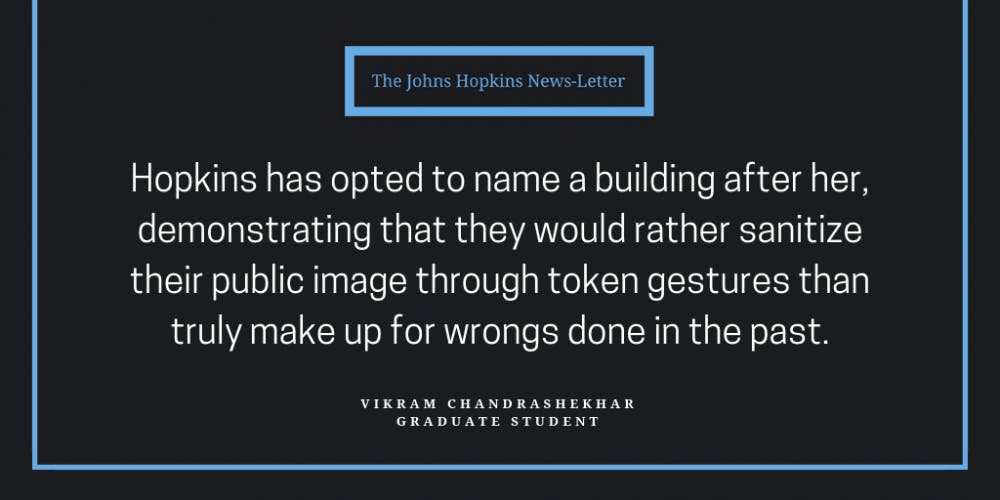University President Ronald J. Daniels and School of Medicine Dean Paul B. Rothman announced plans to name a new building in honor of Henrietta Lacks, the source of the immortal HeLa cell line, on Saturday. The new multidisciplinary building will be located on the East Baltimore Campus and is expected to be completed in 2022.
Lacks was an African-American patient at the Hopkins Hospital, who died of cervical cancer in 1951. During a procedure, the Hospital took her genetic material without her consent. These cells, known as HeLa cells, were the first “immortal” human cells, meaning that they did not die after a set number of divisions. Before this, cultured cells would only survive for a few days. HeLa cells have significantly contributed to the study of the human genome, leukemia and other cancers.
Controversy has surrounded the cells in recent years. In June, a lawyer representing three immediate descendants of Lacks’ announced that they would file a petition to seek guardianship of these cells. Lacks’ family was unaware for a long time that the cells were being used around the world for medical development and profit.
In an email to The News-Letter, graduate student Vikram Chandrashekhar noted that some of Lacks’ family members have sought monetary compensation for the medical research that profited from her genetic material. Because of this, he criticized the decision to name a building after Lacks.
“On its face, the gesture of naming a building after Henrietta Lacks is substantial, but not only does this not address the wishes of the Lacks family, it also doesn’t materially change the lives of members of the
Lacks family,” he wrote. “Instead, Hopkins has opted to name a building after her, demonstrating that they would rather sanitize their public image through token gestures than truly make up for wrongs done in the past.”
According to the press release published by the University, the building will expand on the Berman Institute of Bioethics and will focus on programs that enhance partnership between Hopkins and the community and promote studies about research ethics.
“Through her life and her immortal cells, Henrietta Lacks made an immeasurable impact on science and medicine that has touched countless lives around the world,” Daniels wrote. “We at Johns Hopkins are profoundly grateful to the Lacks family for their partnership as we continue to learn from Mrs. Lacks’ life and to honor her enduring legacy.”
Jeri Lacks, Henrietta Lacks’ granddaughter, attended the event and said she was glad that her grandmother was receiving recognition from the community.
“It is a proud day for the Lacks family. We have been working with Hopkins for many years now on events and projects that honor our grandmother,” she wrote in a press release. “They are all meaningful, but this is the ultimate honor, one befitting of her role in advancing modern medicine.”
Jeffrey Kahn, director of the Johns Hopkins University Berman Institute of Bioethics explained how the story of Henrietta Lacks shaped ethics research.
“Henrietta Lacks has encouraged us all to examine, discuss and wrestle with difficult issues that are at the foundation of the ethics of research, and must inform our relationships with the individuals and communities that are part of that research,” Kahn wrote in a press release. “As a result, students, faculty and the entire research community at Johns Hopkins and around the world do their work with a greater sensitivity to these critical issues.”
In 2013, the University worked with members of the Lacks family and the National Institutes of Health (NIH) to create a committee that requires scientists to request permission to use HeLa cells in NIH-funded research. This NIH committee includes two members of the Lacks family.
The plans for the new building were announced at the ninth annual Henrietta Lacks Memorial Lecture. The Hopkins Institute for Clinical and Translational Research (ICTR) hosted this lineup of speakers, including doctors and professors from the School of Medicine and descendants of Lacks’.
The lecture also included talks on treatments for cervical cancer, protecting human participation rights in research and historical reflections on Lacks’ story.
Dr. Cornelia Trimble began her discussion about cervical cancer research by highlighting HeLa cells’ positive effect on the medical community, such as their contribution to the development of the polio vaccine.
Trimble noted improvements in treating cervical cancer patients as a result of her team’s research and the relationship between clinical research trial participants and researchers. She described clinical trials as a partnership and stressed the importance of consent throughout the process.
Trimble concluded by emphasizing the improvements in immunotherapy and treatment for cervical cancer.
“Our progress is real, it’s concrete. It’s not anecdotal anymore,” she said.
Leah Cole, a student at the University of Maryland, College Park, was interested in this focus on consent in clinical trials.
“They’re working to have a better relationship between people who are involved in research and researchers,” she said.
Speakers addressed participation in clinical trials with respect to class and race. David Lacks Jr., Henrietta Lacks’ grandson, emphasized the importance of minority doctors and researchers.
“We are not just the people who are being researched on, we are also doing research. We are not just the people on the table,” he said.





